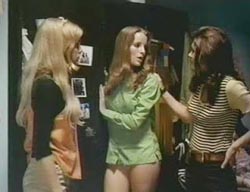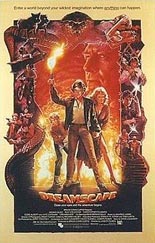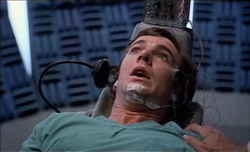
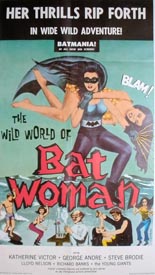 Rated G for gawd-awful, The Wild World of Batwoman! may represent the most shameless cash-grab in the cinematic history of coattail-riding. I’m tempted to think even Roger Corman, King of the B-Movie Clone, would shake his head at writer/director/producer Jerry Warren’s transparent attempt at turning America’s Bat-mania into holy simoleons.
Rated G for gawd-awful, The Wild World of Batwoman! may represent the most shameless cash-grab in the cinematic history of coattail-riding. I’m tempted to think even Roger Corman, King of the B-Movie Clone, would shake his head at writer/director/producer Jerry Warren’s transparent attempt at turning America’s Bat-mania into holy simoleons.
At the time of the mild Wild, ABC was cowl-deep in a ratings and cultural bonanza with the Pop Art-influenced Batman series starring Adam West and Burt Ward. Warren’s greedy response was to throw together this intentionally silly hour of no power, funded presumably with whatever change he found on the way to the office. The only way the huckster could appear more flagrant is if he had named his heroine Batgirl.
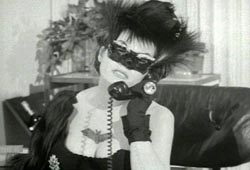 Batwoman (Katherine Victor, Warren’s Teenage Zombies) may sport the curves of TV’s Yvonne Craig, but bat-insignia aside, similarities screech to a halt. Her face hidden by a cheap party mask and her hair covered in a mess of feathers, Batwoman looks less like a superhero and every bit a drag queen — only her vacuum-packed bosom proves she is a she. In dreary monotone, she communicates via wrist radio (calling Dick Tracy!) with her coven of bikinied Batgirls. The obedient young women are vampires, “but only in the synthetic sense,” which means they drink yogurt instead of blood, whatever the fuck that means.
Batwoman (Katherine Victor, Warren’s Teenage Zombies) may sport the curves of TV’s Yvonne Craig, but bat-insignia aside, similarities screech to a halt. Her face hidden by a cheap party mask and her hair covered in a mess of feathers, Batwoman looks less like a superhero and every bit a drag queen — only her vacuum-packed bosom proves she is a she. In dreary monotone, she communicates via wrist radio (calling Dick Tracy!) with her coven of bikinied Batgirls. The obedient young women are vampires, “but only in the synthetic sense,” which means they drink yogurt instead of blood, whatever the fuck that means.
The tissue-thin plot involves numerous parties — namely, panty hose-faced Rat Fink (Richard Banks, Warren’s Frankenstein Island) — aching to get a hold of an “atomic hearing aid” capable of listening to any telephone conversation. Speaking of scientific discoveries, “happy pills” slipped to the girls makes them so lax, they go-go dance for what viewers will swear is days on end. Also starring in this incredibly boring oddity is no one of note, plus the equally talented chocolate milk and soup. —Rod Lott

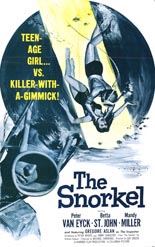
 Hammer Films’
Hammer Films’ 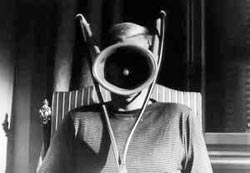
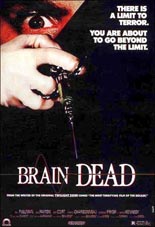
 Adam Simon’s
Adam Simon’s 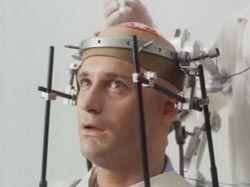
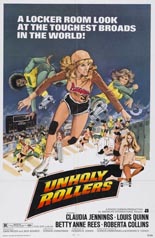
 Sick of being sexually harassed by the boss, cat-food factory worker Karen Walker (Claudia Jennings,
Sick of being sexually harassed by the boss, cat-food factory worker Karen Walker (Claudia Jennings, 